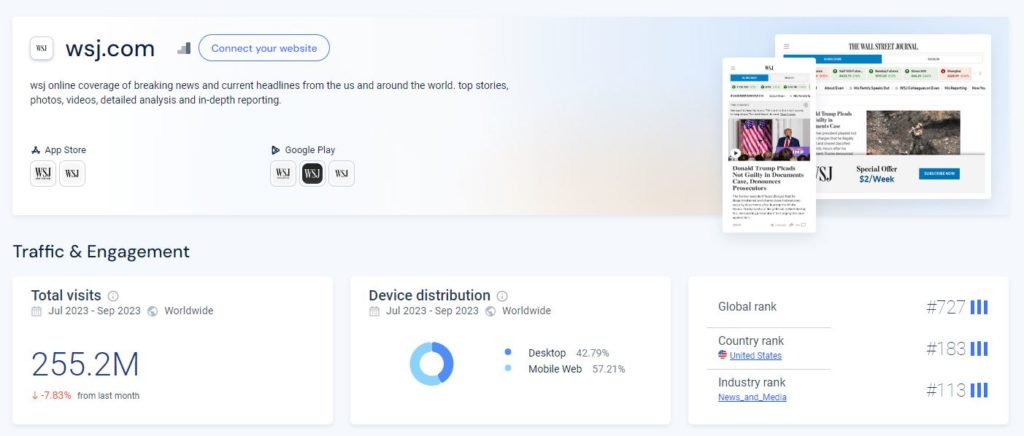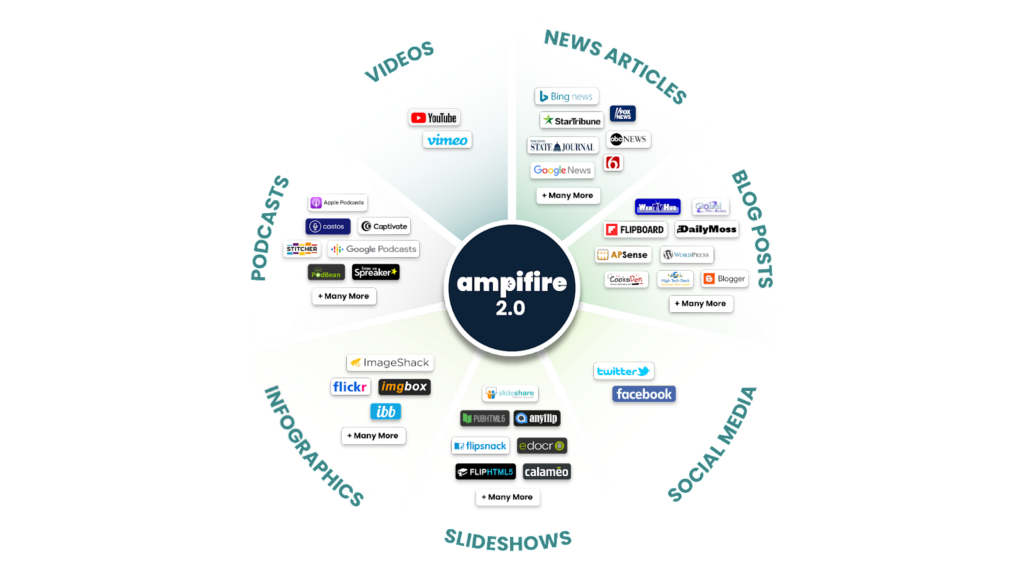- The Wall Street Journal Press Release vs. Submitting a News Story Tip
- How to Contact The Wall Street Journal to Feature Your Story
- How to Submit a Press Release & Publish Directly on The Wall Street Journal
- How to Get a Backlink from The Wall Street Journal
- Use AmpiFire to Publish to The Wall Street Journal
- Frequently Asked Questions

The Wall Street Journal Press Release vs. Submitting a News Story Tip
The Wall Street Journal (WSJ) is not just any publication; it’s a powerhouse in the world of journalism. Established in 1889, the WSJ has grown to be one of the world’s most esteemed financial publications, boasting a staggering 2.4 million digital subscribers. Not just that, the website racks up over 42 million monthly visitors, cementing its position as a leader in the field.

Press Release vs. News Story Tip: What’s the Difference?
Now, let’s get down to the heart of the matter. You’ve got a story to tell, and you’re considering the WSJ. But should you opt for a press release or a news story tip?
Press Release: This is an official statement or a structured piece of news that companies and individuals want to share with the public. By publishing a press release directly on WSJ, you have the assurance that your message remains intact and is presented exactly how you envision it. It’s ideal for product launches, company announcements, or any other significant news you wish to share.
News Story Tip: Unlike a press release, a news story tip is essentially a suggestion you give to journalists at WSJ. It’s a seed of a story that you think they might want to cover. Remember, when you submit a tip, you’re at the mercy of the WSJ’s editorial team. They might pick it up, or they might not. And even if they do, the final story might look different from what you had in mind. This method, however, can sometimes provide a more organic reach, especially if the WSJ takes a keen interest in your tip and turns it into a feature piece.
In essence, your choice boils down to control versus potential organic coverage. If you want to control the narrative, go for a press release. But if you’re willing to gamble on the chance of gaining more organic traction, a news story tip might be your best bet.
How to Contact The Wall Street Journal to Feature Your Story
This will be your go-to section for all necessary contact details. Below is a partial list of journalists that work for The Wall Street Journal. It is critical before submitting your press release that you determine the best point of contact.
- Ryan Tracy: Reporter, Technology Policy – The Wall Street Journal
- LinkedIn: Ryan Tracy’s LinkedIn
- Julia Carpenter: Writer – The Wall Street Journal
- LinkedIn: Julia Carpenter’s LinkedIn
- Keach Hagey: Reporter – The Wall Street Journal’s Media and Marketing Bureau
- LinkedIn: Keach Hagey’s LinkedIn
- Joanna Stern: Senior Personal Technology Columnist – The Wall Street Journal
- LinkedIn: Joanna Stern’s LinkedIn
- Chip Cutter: Reporter – The Wall Street Journal
- Email: chip.cutter@wsj.com
- Ben Ashwell: News Editor, Live Journalism – The Wall Street Journal
- LinkedIn: Ben Ashwell’s LinkedIn
Additionally, you can reach out to The Wall Street Journal directly. For general news tips and press releases, contact them at wsjnews@wsj.com.
The Do’s and Don’ts of Contacting The Wall Street Journal
Now, the way you pitch can make or break your chances. Here are some Do’s and Don’ts to guide you:
Do’s:
- Do Your Homework: Familiarize yourself with the kind of stories WSJ covers. Tailor your pitch to fit their style and audience.
- Be Precise: Get to the point. Offer concise, newsworthy details without fluff.
- Follow Up: If you haven’t heard back in a week or two, send a polite follow-up email. Sometimes, messages can get lost in the shuffle, and a gentle reminder can do wonders.
Don’ts:
- Avoid Mass Emails: Sending generic, mass-produced emails can come across as impersonal and spammy. Customize your pitch for The Wall Street Journal.
- Don’t Be Pushy: While following up is essential, don’t become that incessant, nagging voice in their inbox. Space out your communication.
- Steer Clear of Clickbait: Sensationalism may work elsewhere, but WSJ readers and editors expect substance. Don’t resort to misleading headlines or exaggerations.
Most importantly, be genuine in your approach. Authenticity shines through, and if your story holds merit, the chances are that The Wall Street Journal will recognize its value.
How to Submit a Press Release & Publish Directly on The Wall Street Journal
Before even thinking of hitting that ‘send’ button, you need to ensure that your press release is newsworthy, engaging, and tailored for The Wall Street Journal’s audience. It’s not just about presenting facts; it’s about telling a compelling story.
Submission Steps:
- Head to the official website: Navigate to the ‘Contact Us’ or ‘News Tips’ section of The Wall Street Journal website. Here you’ll often find detailed guidelines and channels to submit your news.
- Use the Dedicated Portal: Some major publications, like WSJ, may have a dedicated portal for submissions. This ensures your release lands directly in the eyes of decision-makers.
- Follow the Format: Most importantly, adhere to any specified formats. This might include word counts, headings, or other specific criteria.
- Include Multimedia: Enhance your press release with high-resolution images, infographics, or videos if the platform permits.
Streamlining Your Submission with AmpiFire:
Looking to optimize your submission process? AmpiFire can be your game-changer. Besides guiding you in creating compelling content, this platform offers a streamlined approach to distribute your press releases to top-tier platforms like The Wall Street Journal. It not only amplifies your visibility but also ensures that your content is presented in the best light possible. Remember, in the competitive world of news, every edge counts. Learn more about AmpiFire and how it can help your business here!

How to Get a Backlink from The Wall Street Journal
In the realm of digital marketing, a backlink is a link from one website to another. It’s akin to a vote of confidence, signifying that the linking website finds the content valuable or relevant. For brands and businesses, securing backlinks from esteemed platforms like The Wall Street Journal is equivalent to striking gold; it bolsters website authority, drives traffic, and enhances search engine visibility.
Steps to Secure that Coveted WSJ Backlink:
- Create Newsworthy Content: The Wall Street Journal won’t link to just any content. Your piece must be compelling, timely, and relevant to their readership.
- Engage with WSJ Journalists on Social Media: Establishing relationships with journalists can be invaluable. Comment on their articles, share their work, or initiate thoughtful discussions. Just ensure it doesn’t come off as self-promotional.
- Guest Contributions: Pitching guest articles or opinion pieces on current events or industry trends can open the door to potential backlinks. Focus on offering unique insights that the WSJ audience would find valuable.
- Leverage Research or Original Data: Journalists love fresh data. If your business conducts research or surveys, share these findings. They can serve as valuable resources for WSJ writers looking for credible sources.
- Respond to HARO (Help a Reporter Out) Queries: Journalists often use HARO to find expert sources for their stories. By providing insightful responses, there’s a chance your contribution gets picked and linked back to.
Remember, while securing a backlink from The Wall Street Journal, Reuters, or Forbes is immensely beneficial, it’s equally challenging. However, with persistence, networking, and offering genuine value, you can pave your way into WSJ’s digital pages and, consequently, their vast readership.

Use AmpiFire to Publish to The Wall Street Journal
AmpiFire, a renowned content amplification platform, is the key to streamlining the process of getting your content directly onto many prestigious platforms. But how does this platform bridge the gap between you and such a high-profile publication? Additionally, AmpiFire offers a premium service, which provides even more benefits to your content. Though AmpiFire does not currently submit to The Wall Street Journal, it can still be a valuable tool in strengthening your reach.
AmpiFire’s Premium Service
- Tailored Content Creation: Every platform has its unique tone, style, and audience. AmpiFire’s premium service ensures that the content curated for WSJ aligns with the publication’s stringent standards.
- Optimized for Engagement: The content isn’t just dumped onto platforms. AmpiFire crafts it in ways that maximize engagement, ensuring your piece doesn’t get lost in the sea of articles.
- Seamless Integration with Marketing Strategies: Whether you’re aiming for brand visibility, driving traffic, or generating leads, AmpiFire’s service integrates seamlessly with your broader marketing goals, making The Wall Street Journal a pivotal part of your strategy.
AmpiFire’s premium service isn’t merely about amplifying content—it’s about strategically placing it where it matters most. If The Wall Street Journal is on your radar, employing AmpiFire can be the game-changer, elevating your brand’s presence on one of the world’s most respected platforms.
Want to improve your brand presence online and see organic results?
Discover AmpiFire and get your press releases be seen on Google News, YouTube, SlideShare, Apple Podcasts and many more…
Click Here To Learn More
Now that you’re equipped with the knowledge, it’s time to amplify your brand’s voice on prestigious platforms like WSJ. Ready to elevate your brand’s reputation and reach? How would being featured on The Wall Street Journal change your brand’s trajectory?
Frequently Asked Questions
Absolutely! The Wall Street Journal is a globally respected platform with millions of readers. Submitting a press release to WSJ not only adds prestige to your brand but also exposes you to a wide audience that values quality content. However, there are other platforms like The New York Times or The Financial Times, which also have their merits. It’s essential to evaluate your brand’s needs and the audience you want to target.
Press releases are typically comprehensive pieces that promote a product, service, or significant event, while news story tips are shorter, timely insights or leads for potential news stories. The former is more about branding, and the latter is about breaking news.
Professionally introducing yourself and having a clear, compelling story pitch is the golden rule. However, cold emails might not always get through. It’s advisable to build a relationship with journalists or use platforms like AmpiFire for a more structured approach.
Besides the significant exposure to a global audience, being featured on WSJ adds credibility to your brand. It signals that you’re a key player in your industry. Contrast this with a smaller platform where the exposure might be limited, and the prestige is not as high.
Backlinks from a reputable source like WSJ can significantly boost your website’s search engine ranking. The reason is that search engines view these as evidence of your site’s credibility. It’s akin to getting an endorsement from a VIP in the digital world. Still, while WSJ’s backlinks are golden, others like those from Forbes or BBC also carry significant weight.
The most straightforward way is by having high-quality content that WSJ would consider linking to. Having a unique perspective, groundbreaking research, or exclusive insights can increase your chances. But remember, it’s competitive out there.
While AmpiFire significantly increases the chances due to its premium services and partnerships, no platform can guarantee publication on WSJ. It’s all about the content’s quality and relevance.
AmpiFire stands out due to its premium services and strategic partnerships with top-tier platforms like WSJ. Other services might offer broader distribution, but they often lack the targeted approach AmpiFire boasts. Think of it as the difference between a shotgun and a sniper rifle.
DO professionally introduce yourself, provide clear context, and have a compelling story. DON’T be pushy, send generic pitches, or spam multiple journalists at once. Remember, personalization is key!
While WSJ covers a broad spectrum, they have a penchant for business, finance, and tech-related content. However, any story that’s newsworthy, groundbreaking, or provides unique insights stands a good chance.
